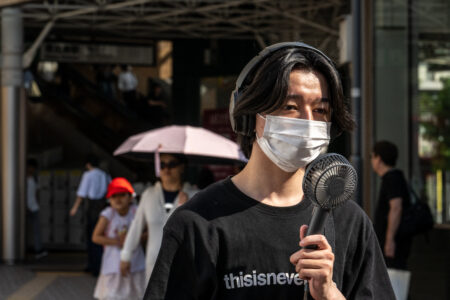
Winter prompts visions of fluffy snow and snowball fights, winter markets, Christmas, and all things cosy.
For international students who come from places nearer to the tropics, it’s like stepping into a movie scene.
But on the other side of the same coin are temperatures plummeting, the days getting shorter, and a hint of a gloom that the season brings.
So, it’s no surprise you’re searching for how to beat the winter blues.
The winter blues aren’t just a poetic term; it’s real and can drain your energy and joy faster than the cold wind cutting through your coat.
But here’s the good news: you don’t have to hibernate or wait till spring to feel better.

While both winter blues and SAD can make winter feel tough, SAD is a more severe form of depression due to seasonal light changes. Source: AFP
Winter blues vs seasonal affective disorder
Winter blues and seasonal affective disorder (SAD) are two different conditions.
As winter approaches, you may feel the “winter blues” — feeling sad or wanting to stay home due to the shortened days, cancelling plans, or sleeping a little longer than usual. The winter blues may hit harder for those who aren’t able to return home for the winter holidays.
However, the winter blues only occurs during the winter month and does not affect daily life.
Seasonal affective disorder, though, is different as it can impair a person’s daily life over a significant period. The National Institute of Mental Health defines it as a type of depression characterised by a recurrent seasonal pattern, with symptoms lasting about four to five months out of the year.
The signs and symptoms of SAD include those associated with depression as well as disorder-specific symptoms that differ for winter-pattern versus summer-pattern SAD.
A way to notice individuals with SAD is that they tend to be withdrawn, have low energy, oversleep, or even put on weight.

Studying in warmer climates isn’t just about escaping the cold — it can boost your mood, energy, and productivity. Source: AFP
The benefits of studying in warmer climates
Studying in a winter wonderland may be a dream for many, but you may benefit more from studying in a country with a warmer climate.
Warmer countries will allow you to don fewer layers, while you’ll need to bundle up in cold countries. The fewer items for clothes you have means it’ll be faster for you to put an outfit together. You won’t need to worry about what the temperature will be like throughout the day.
An Australian study has shown sunnier days promote positive and happier moods than cold days.
Another study comparing 1.6 million people in the US and China revealed the same — those living in warmer areas of both countries ranked higher in what the researchers considered as the five main personality indicators: agreeableness, conscientiousness, emotional stability, extraversion, and openness to experience.
Meanwhile, cold weather triggers a survival instinct, making you want to eat more.
Besides, eating ice cream or drinking cold beverages in winter isn’t as fun as having them in summer.
But just because it’s beneficial to study in warmer climates doesn’t mean you should put colder countries aside when deciding to study abroad.
For those already studying abroad and facing the winter blues, there are ways for you to fight it.

Starting your day earlier helps you catch more daylight, boosting your mood and energy. Sneak in a morning walk while you’re at it. Source: AFP
1. Start your day earlier
Getting out of bed is one of the most challenging tasks during winter, but starting your day earlier is step one in learning how to beat the winter blues.
By doing this, you’ll be able to get many things done before the day gets dark again. Waking up early in the morning can also help you start a routine that will help you get through the winter months. You’ll also be able to get additional sunlight exposure if you were to start your day early.
Another benefit of getting up early in the morning is that it may lead to greater well-being, and you’ll be at a lower risk of depression, according to a study by the University of Exeter and Massachusetts General Hospital.
Here are a few ways for you to force yourself out of bed earlier:
- Sign up for morning workout classes
- Go for a coffee run at your favourite cafe
- Putting your alarm on the other side of the room
- Keep part of your curtains open to allow natural sunlight in
2. Have a designated study space
When it’s snowing or too cold to move around, finding good places to study and stay motivated during winter is hard.
A way to go about it is by picking a designated study space. The thought of having to trek in the snow or get out into the cold might make you feel like that’s too much for you and may put you off from wanting to study or complete your assignments.
When looking for a place to study, you should consider the heating and lighting. Poor heating may make you feel cold and distract you, while low lighting may prevent you from focusing.
Although sunlight hours are short in winter, sitting by a window when it’s bright outside can benefit you. A good view can boost your mood and motivate you to study too.

Even on chilly days, soaking up sunlight can lift your spirits and boost your much-needed vitamin D. Source: AFP
3. Seek out the sun
While this may be a little hard to come by on a snowy winter day, seeking out sunlight for even 10 minutes is one of the best ways on how to beat the winter blues.
Some may fear that exposure to UV rays may harm your health; however, researchers from the University of Edinburgh have found that individuals in low-sunlight countries benefit from exposure to the sunlight’s UV rays.
The benefits of seeking out the sun are:
- Helping your body produce serotonin, which can boost mood, energy, and focus
- Minimise stress levels
- Reduce symptoms of depression and SAD
- Improve sleep quality, which can affect your academic performance
4. Get a light therapy lamp that can stimulate sunlight in your bedroom
If you’re unable to get in some sunlight during the day, there’s another solution on how to beat the winter blues, and that’s by getting a lamp that stimulates sunlight.
Light therapy lamps can stimulate sunlight and help those affected by SAD brighten up their days, help realign their circadian rhythm, and boost serotonin production.
Suppose you cannot get a light therapy lamp; a regular lamp with a light intensity of 10,000 lux producing as little UV light works well, according to research.
Additionally, placing it about 16 to 24 inches away from your face and using it for about 20 to 30 minutes during the first hour after waking up can help treat the winter blues.
5. Take vitamin D
Consider taking vitamin D supplements during winter when sunlight is limited.
Vitamin D deficiency is common in cold countries due to the shorter days and more time spent indoors. It’s essential for many reasons: it helps your body absorb and regulate calcium and contributes to inflammation and stress resilience. In return, you’ll maintain your bone strength and regulate its function.
Supplements aren’t the only way to get vitamin D; it’s also found in foods such as salmon, mackerel, red meat, liver, egg yolks, and breakfast cereals.
6. Pursue new interest
A 2024 study found that high temperatures tend to hurt work-related activities, as they can make workers uncomfortable and irritable, so lower temperatures are the perfect time to discover new hobbies or sharpen your existing skills.
This can benefit you as it helps improve confidence and mental health, increase creativity, provide personal fulfilment, and even develop social connections with others interested in the same hobbies.
A few winter hobbies you can pursue to beat the winter blues include reading, painting, crocheting, baking, yoga, or ice hockey.

Staying active during the cold winter months keeps your energy and spirits high. Bonus, it warms you up, too. Source: AFP
7. Exercise
Exercising is generally good, but this is the best solution for beating the winter blues.
While you might want to lay in bed all cuddled up with a cup of hot chocolate, there are many benefits to exercising during winter. This includes boosting your immune system, improving your mood, and fighting off winter fatigue.
The bonus is that you can burn additional calories.
When you’re cold, your body naturally burns calories to warm you up and working out in the cold might help you train longer and harder. Besides, colder countries have a low risk of heat exhaustion or heat stroke.
If your class schedule permits you, head to the gym for an hour or two. Otherwise, there are many other alternatives to working out in the gym — you could load up the varied workout videos on YouTube, like a quick 30-minute indoor cardio circuit or even dance workouts to get you pumped up.
8. Have a sleep routine
Sleeping in is a favourite for many during winter, but having a healthy sleep routine can beat the winter blues.
A healthy sleep routine consists of going to bed and waking up at the exact times each day, keeping your surroundings dim to help your body clock, avoiding big meals before bed, keeping your bedroom at a comfortable temperature, and limiting coffee intake before sleep.
Building your pre-bed routine, like doing your skincare or trying calming activities such as reading or medication, can help prime your body and mind for a restful sleep.

Upbeat tunes can brighten even the gloomiest winter days. Create a happy playlist and dance through the winter blues one song at a time. Source: AFP
9. Listen to upbeat tunes
Scientists at the University of Oxford found that environmental factors such as weather conditions and seasonal patterns can significantly shape listeners’ preferences and choices — meaning if you’re in a cold country, you’re more likely to listen to sad songs.
However, it is advised to listen to upbeat songs to beat the winter blues. Researchers found that listening to upbeat and high-energy music can help elevate mood and boost motivation.
We’ve compiled a list of upbeat and catchy songs you can add to your winter playlist, but don’t listen to them before your final exams as it may distract you!
10. Create a support system
It’s easy to feel lonely during winter, especially if you’re not returning home for the holidays.
Creating a support system is, therefore, essential for an international student as it can help you overcome the challenges that you’re facing. Your support system can consist of friends and family from back home or friends that you have met in the country you’re studying in.
However, some people may find it hard to accept support, even if it’s from people who are close to them. Accepting help can help you balance relationships and let your loved ones know you’ll be okay.
And when in doubt, ask your university for help — they’re always just a call away.











